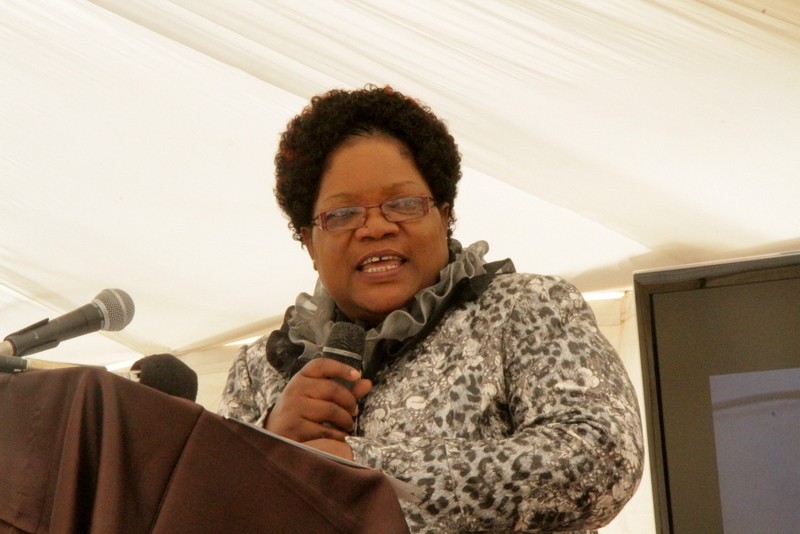
If an epitaph on the political career of Zimbabwe’s first woman vice-president were to be written one day it would likely read, “so near yet so far, here lies the remains of the first woman leader Zimbabwe never had”.
BY RICHARD CHIDZA
Unless she springs a serious political comeback under People First, former Vice-President Joice Mujuru may be remembered as a woman who was a “heartbeat away from the presidency”.
Born Runaida Mugari before marrying revered wartime commander Solomon Mujuru at the height of the liberation struggle, a legend initially supported even by Mugabe had it she had downed a Rhodesian chopper in the heat of battle.
Beyond that, her war exploits began to be deconstructed by her enemies at the tail-end of last year after First Lady Grace Mugabe declared that she be “baby dumped”. Little is written of Mujuru besides the fact that she was a leading woman figure in the struggle for Zimbabwe.
As for her time in cabinet, Mujuru is well-known for her bid to scupper the establishment of millionaire businessman Strive Masiyiwa’s Econet Wireless in the mid to late 90s when she was serving as Minister of Information, Post and Telecommunications. She, at the time, reportedly described then Vice-President Joshua Nkomo, later to be christened Father Zimbabwe, as a “senile old man”. Nkomo had tacitly supported Masiyiwa’s application for a licence. As fate would have it, the entrepreneur approached the court and won the case.
But this did not stop her meteoric rise and with Mugabe’s political sunset visible, jockeying for the veteran strongman’s position began.
As Emmerson Mnangagwa (now Vice-President) readied himself to be anointed heir to the throne, Mugabe pulled the rug from under his feet with a midnight constitutional change that added a clause in the party charter that said “one of the two vice-presidents must be a woman”.
- Chamisa under fire over US$120K donation
- Mavhunga puts DeMbare into Chibuku quarterfinals
- Pension funds bet on Cabora Bassa oilfields
- Councils defy govt fire tender directive
Keep Reading
So the stage was set and Mujuru waltzed into the country’s presidium while Mnangagwa recoiled with a whimper. But Mugabe, always the wily political fox, used the same tactic to torpedo Mujuru, once again forcing through a constitutional change to remove the same clause that had brought the country’s first female deputy president.
The turning point in Mujuru’s fight for power, or quest to succeed Mugabe, was the death of her husband in 2011 in an unexplained inferno. He was the power behind her, hence his death left her with no helping hand, at a time when Grace was starting to consolidate her grip on Zanu PF.
“From then on, things were never the same and the writing was on the wall for her. Anything else that we did was trial and error,” said a senior figure linked to Mujuru.
When the likes of former secretary for administration Didymus Mutasa openly supported her claim to power, the die was cast. Mugabe felt his position threatened and let loose “his dogs” and the rest, as they say, is history.
Mujuru was to be accused of corruption and of leading a team that wanted to topple President Mugabe. She was unceremoniously booted out of Zanu PF and now Mujuru — who is concentrating on farming in Beatrice — may have to start all over again to fight for the presidency come 2018.
Hers is a clear case of the presidency being so near, yet so far and success now depends as much on her own efforts as it does on Mugabe keeping his “dogs at bay”, and concealing any skeletons that she may have tucked away when she was in government.
Political analyst Ibbo Mandaza, among a host of others canvassed by The Standard, rejected the idea peddled by her detractors, that Mujuru is all but finished.
“Mujuru has grown bigger and as you can see, the effects of her removal are now being felt. Zanu PF is at odds with itself, it has never been this divided and Mugabe does not seem to have a solution to the problems in the party or in his administration. It is not over until it is over. If anything, it is not Mujuru who lost but Mugabe,” Mandaza said.
The most significant statement coming from Mujuru following her ouster has been her “apology” to Zimbabweans over her role in the collapse of the Zimbabwean political state.
Another political analyst Pedzisai Ruhanya warned that Mujuru must be ready to bite the bullet if her political career was to be revived.
“When she gets the chance to tackle the failures of the government, Mujuru should be ready to go for the jugular, tackle real issues, and point at the things that went wrong during her stay in government and how they could have been handled better. Mujuru should be ready to break with the past and not be seen to be trying tacitly or otherwise to protect her economic interests gathered in the last 30 years or so. She should never be seen to be trying to protect herself from prosecution by the State,” said Ruhanya.
Kent University lecturer and socio-political analyst Alex Magaisa, writing recently on his blog, said Mujuru still had a chance but could not afford to ignore the existing opposition structures, especially that of former Prime Minister Morgan Tsvangirai. Rugare Gumbo, one of Mujuru’s biggest supporters and a feared liberation war stalwart, insists Mujuru will lead an opposition coalition come 2018.
“We will tell you when the time comes, but she will come and we are working hard with all democratic forces to make the dream of a democratic state in Zimbabwe a reality,” Gumbo said.











